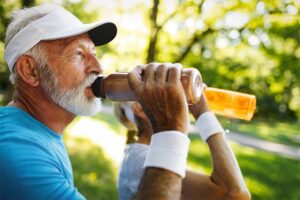
Hot Weather Safety Tips for Older Adults
As temperatures climb, older adults face increased risks from the heat. Due to physiological changes that come with aging, seniors are more susceptible to heat-related health issues, such as heat stroke and dehydration. Here are essential safety tips for older adults to stay safe during hot weather.
Stay Hydrated
Hydration is crucial, as dehydration can happen quickly in older adults, sometimes without obvious signs. It’s recommended that seniors drink at least 8 glasses of water throughout the day, even if they don’t feel thirsty. Avoiding caffeinated and alcoholic beverages, which can lead to fluid loss, is also important.
Be Mindful of Thick Fabrics
Thick or heavy fabrics can trap heat and hinder the body’s ability to regulate temperature. Older adults should wear loose, lightweight, and light-colored clothing. Fabrics like cotton are ideal as they allow the skin to breathe and stay cool.
Stay Indoors During Extreme Heat
During periods of extreme heat, the safest place is indoors. If possible, older adults should plan their day to avoid going out during the hottest times, typically between 10 a.m. and 4 p.m.
Stay in an Air-Conditioned Place
Air conditioning is the best defense against heat-related illness. Seniors should stay in air-conditioned environments during heat waves as much as possible. If someone doesn’t have air conditioning at home, they should spend time in public facilities that do, such as libraries, shopping malls, or designated community cooling centers.
Know the Weather Forecast and Dress Appropriately
Being aware of daily weather forecasts can help seniors prepare adequately for the heat. Dressing appropriately means choosing light-colored and loose-fitting clothes and wearing a wide-brimmed hat and sunglasses to protect from the sun’s rays.
Protect Your Skin and Eyes
Older adults should use a broad-spectrum sunscreen with an SPF of 30 or higher to protect their skin from harmful UV rays. Sunglasses with UV protection are also essential to safeguard the eyes and the sensitive skin around them.
Know the Side Effects of Your Prescriptions
Some medications can increase sensitivity to the sun and heat or impair the body’s ability to stay hydrated. Older adults should consult with their healthcare provider to understand any risks associated with their prescriptions during hot weather.
Maintain Communication with Friends, Family, Caregivers, and Emergency Contacts
It’s important for seniors to maintain regular communication with their support network. Friends, family, and caregivers should check in frequently on older adults during heatwaves. Having a list of emergency contacts readily available can also provide additional safety.
Conclusion
By following these safety tips, older adults can enjoy the summer months while minimizing the risks posed by hot weather. Staying informed, prepared, and connected are key strategies to staying healthy and safe. If you’re an older adult or care for one, take these precautions seriously and adjust daily routines to accommodate the rising temperatures.
